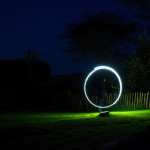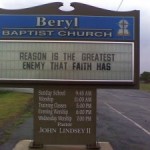We run our website the way we wished the whole internet worked: we provide high quality original content with no ads. We are funded solely by your direct support. Please consider supporting this project.

The Benefit of the Doubt
In my last two posts (here and here) I’ve given five arguments against the common way Evangelical Christians tend to think about faith. More specifically, I’m calling into question the assumption that a person’s faith is as strong as they are free of doubt. I’ll conclude this line of questioning today by offering four other arguments I’d like us to consider.
* The certainty-seeking, doubt shunning model of faith tends toward hypocrisy.
I recall attending an apologetics conference in which a speaker was subjecting various beliefs in Islam to a rigorous critique. When it was time for the speaker to field questions, a person asked how he could get his Muslim neighbor “saved” when this neighbor was absolutely certain of his beliefs and certain Christianity was wrong. The speaker basically said that unless a non-Christian is willing to entertain some level of doubt and consider their beliefs mistaken, there is no hope for them. But he assured the person asking the question that if Muslims and other unbelievers choose to resist the Spirit of God and arrogantly assume the correctness of their views, this was no one’s fault but their own.
I completely agree that one must be open to questioning their belief system if they are ever to be persuaded otherwise, but it strikes me as hypocritical for Christians to demand this of others if they aren’t willing to apply it to themselves. Indeed, in the doubt-shunning model of faith we’re talking about, its considered a virtue for Christians to be certain they’re correct but a damning vice for others to do so. Conversely, many consider it sin, or at least a sign of a defective faith, for Christians to doubt their faith while thinking it a sin for others NOT to doubt their faith.
Is this not hypocritical? I’m reminded of Jesus’ teaching about looking for dust particles in the eyes of others while failing to notice the planks in our own eyes.
* The model of faith that rewards people for pushing doubt aside to make themselves certain is psychologically harmful.
Years ago I was in a prayer meeting for a young man who was dying of cancer. We were all encouraged to have faith and not doubt so this young man could be healed. “According to our faith,” a lady said, “it will be done for our friend.” I, along with everyone else in this meeting, immediately felt the pressure of having this man’s life hang in the balance as we tried to push doubt aside and make ourselves certain he would be healed so he could actually be healed.
This is psychological torture! But as I’ve said, the stakes are actually much higher than this, for most Evangelical Christians claim that our eternal welfare depends on this mental gimmickry!
This young man ended up dying of cancer, which brings me to another dimension of the psychological harm this model can cause. In my years of ministry I’ve encountered dozens of people who blame their own “lack of faith” for a loved one’s death or for some other tragedy. One dear lady I briefly met had been led to believe by her pastor and the church she attended that the reason her baby was deformed and mentally disabled was because of her lack of faith. I tried desperately to help her to see that she was not at fault, but to no avail. A short while later I learned that she had taken the life of her child and then took her own life as well. Believe me, this kind of faith is harmful and potentially deadly!
* The certainty-seeking model of faith presupposes an ugly picture of God.
In the above mentioned prayer meeting, I recall imagining God up in heaven saying to us: “If you are able to make yourselves certain your friend will be healed, he will be healed. If not, he dies.” And I recall wondering how this picture is consistent with the revelation of God that we’re given in Christ. It’s my impression that this model of faith actually portrays God more along the lines of Al Capone. It was as if he were holding our friend captive as he made the bizarre demand that we engage in the mental trick of making ourselves certain if we want him to live.
And remember, in this model of faith, God not only does this with people’s healing; whether people end up in heaven or hell depends on their ability to comply with the demand to become sufficiently certain about the right beliefs.
God loves every person he created infinitely more than I love (say) my precious grandchildren. Yet, I can’t for a second imagine myself sending them to a place of endless torment (or to be annihilated, if you’re an annihilationist) because they sincerely doubted certain beliefs!
* Finally, the model of faith that encourages people not to doubt can be very dangerous.
Most of the religiously motivated violence in history — which is at least an ingredient in most violence in history — has been carried out by people precisely because they were absolutely certain they were right. For example, if the 19 Islamist terrorists who killed so many (as well as themselves) on 9/11 had allowed themselves to question their assumptions about violent Jihad and questioned their violent leaders, the Twin Towers would still be standing and some 2500 people would still be alive.
The reasons religion has always contributed to violence is that deals with peoples’ highest ideals. Any ideal that is valued more than human life will be an ideal that people will sooner or later feel justified killing others to protect or advance. Indeed, the only ideal that can’t possibly result in bloodshed is the ideal that Jesus gives by his example and teachings: namely the ideal of self-sacrificial love, in which it is taught that it is better to die at the hands of enemies than to kill them. Unfortunately, few Christians throughout history have taken this teaching seriously, which is why Christianity has caused at least as much bloodshed as any other religion.
To the extent that religious people are certain their violence-justifying ideals are true, their ideals can’t help but lead to more bloodshed. And this why I claim that unquestioning faith is dangerous.
If a person’s beliefs are false, doubting can only help them move closer to truth while curbing their willingness to violently defend them. And if a person’s beliefs are true, doubting will only serve to confirm and refine them. So either way, doubt is not our enemy, but a friend.
These arguments I’ve outlined from my forthcoming book, Benefit of the Doubt, are among the reasons I’m not a fan of the widespread certainty-seeking, doubt-shunning model of faith. And I have not yet even considered the fact that this model is light years apart from the biblical model of faith. I will thus turn to unpack this model in the posts that are to come (Lord and a little time willing).
I encourage you not to strive for certainty; strive instead for faithfulness.
And live in love, as Christ loved you and gave himself for you!
Image by Sukanto Debnath. Used in accordance with Creative Commons. Sourced via Flickr.
Related Reading

Do You Have Enough Faith?
What does it actually mean to have faith? This is a topic I address at length in Benefit of the Doubt, but this post provides a very basic answer to this question. To appropriately understand the New Testament’s teaching on faith, we need to understand faith within the context of our marriage-like covenant with God…

Open2013 Reflections
Both participants and leaders share about what was happening at Open2013 and some of their thoughts on Open Theism. Listen in and hear from Greg Boyd, John Sanders, Tom Oord, T. C. Moore, Jessica Kelley and many more.

A Brief Theology of Faith
It is often argued that Hebrews 11:1 provides us with a clear definition of faith. The NIV translates it as, “Now faith is confidence in what we hope for and assurance about what we do not see.” Most of the times when we use different translations of the Bible, the differences between them are about…

Introduction to ReKnew
There’s never been anyone like Jesus. Not even close. And yet, there’s no greater disconnect in history than the chasm between Jesus and many who claim his name. If you’re like most thinking people, you’re frustrated by that. Or disappointed. The inconsistencies are rampant. Or maybe you’ve recently faced a horrific tragedy and your seemingly…

ReKnew Update I
Greg shares an update on the ReKnew fundraiser. Hope you’ll consider joining this Kingdom movement!

